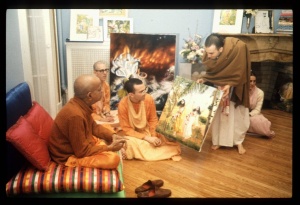SB 1.13.49: Difference between revisions
m (1 revision(s)) |
(Vanibot #0054 edit - transform synonyms into clickable links, which search similar occurrences) |
||
| (One intermediate revision by one other user not shown) | |||
| Line 1: | Line 1: | ||
{{info | {{info | ||
|speaker= | |speaker=Nārada Muni | ||
|listener=King | |listener=King Yudhiṣṭhira | ||
}} | }} | ||
[[Category:Srimad-Bhagavatam - Canto 01 Chapter 13]] | |||
[[Category:Bhagavatam Verses Spoken by Narada Muni - Vanisource|011349]] | |||
<div style="float:left">'''[[Srimad-Bhagavatam]] - [[SB 1|First Canto]] - [[SB 1.13: Dhrtarastra Quits Home|Chapter 13: Dhṛtarāṣṭra Quits Home]]'''</div> | |||
<div style="float:right">[[File:Go-previous.png|link=SB 1.13.48]] '''[[SB 1.13.48]] - [[SB 1.13.50]]''' [[File:Go-next.png|link=SB 1.13.50]]</div> | |||
{{CompareVersions|SB|1.13.49|SB 1965|SB 1972-77}} | |||
{{RandomImage}} | |||
==== TEXT 49 ==== | ==== TEXT 49 ==== | ||
<div class="verse"> | |||
<div | :so 'yam adya mahārāja | ||
so 'yam adya mahārāja | :bhagavān bhūta-bhāvanaḥ | ||
bhagavān bhūta-bhāvanaḥ | :kāla-rūpo 'vatīrṇo 'syām | ||
kāla-rūpo 'vatīrṇo 'syām | :abhāvāya sura-dviṣām | ||
abhāvāya sura-dviṣām | |||
</div> | </div> | ||
| Line 18: | Line 23: | ||
==== SYNONYMS ==== | ==== SYNONYMS ==== | ||
<div class="synonyms"> | |||
<div | ''[//vanipedia.org/wiki/Special:VaniSearch?s=saḥ&tab=syno_o&ds=1 saḥ]'' — that Supreme Lord; ''[//vanipedia.org/wiki/Special:VaniSearch?s=ayam&tab=syno_o&ds=1 ayam]'' — the Lord Śrī Kṛṣṇa; ''[//vanipedia.org/wiki/Special:VaniSearch?s=adya&tab=syno_o&ds=1 adya]'' — at present; ''[//vanipedia.org/wiki/Special:VaniSearch?s=mahārāja&tab=syno_o&ds=1 mahārāja]'' — O King; ''[//vanipedia.org/wiki/Special:VaniSearch?s=bhagavān&tab=syno_o&ds=1 bhagavān]'' — the Personality of Godhead; ''[//vanipedia.org/wiki/Special:VaniSearch?s=bhūta&tab=syno_o&ds=1 bhūta]-[//vanipedia.org/wiki/Special:VaniSearch?s=bhāvanaḥ&tab=syno_o&ds=1 bhāvanaḥ]'' — the creator or the father of everything created; ''[//vanipedia.org/wiki/Special:VaniSearch?s=kāla&tab=syno_o&ds=1 kāla]-[//vanipedia.org/wiki/Special:VaniSearch?s=rūpaḥ&tab=syno_o&ds=1 rūpaḥ]'' — in the disguise of all-devouring time; ''[//vanipedia.org/wiki/Special:VaniSearch?s=avatīrṇaḥ&tab=syno_o&ds=1 avatīrṇaḥ]'' — descended; ''[//vanipedia.org/wiki/Special:VaniSearch?s=asyām&tab=syno_o&ds=1 asyām]'' — upon the world; ''[//vanipedia.org/wiki/Special:VaniSearch?s=abhāvāya&tab=syno_o&ds=1 abhāvāya]'' — for eliminating; ''[//vanipedia.org/wiki/Special:VaniSearch?s=sura&tab=syno_o&ds=1 sura]-[//vanipedia.org/wiki/Special:VaniSearch?s=dviṣām&tab=syno_o&ds=1 dviṣām]'' — those who are against the will of the Lord. | ||
</div> | </div> | ||
| Line 26: | Line 30: | ||
==== TRANSLATION ==== | ==== TRANSLATION ==== | ||
<div class="translation"> | |||
<div | |||
That Supreme Personality of Godhead, Lord Śrī Kṛṣṇa, in the guise of all-devouring time [kāla-rūpa] has now descended on earth to eliminate the envious from the world. | That Supreme Personality of Godhead, Lord Śrī Kṛṣṇa, in the guise of all-devouring time [kāla-rūpa] has now descended on earth to eliminate the envious from the world. | ||
</div> | </div> | ||
| Line 34: | Line 37: | ||
==== PURPORT ==== | ==== PURPORT ==== | ||
<div class="purport"> | |||
There are two classes of human beings, namely the envious and the obedient. Since the Supreme Lord is one and the father of all living beings, the envious living beings are also His sons, but they are known as the ''asuras''. But the living beings who are obedient to the supreme father are called ''devatās'', or demigods, because they are not contaminated by the material conception of life. Not only are the ''asuras'' envious of the Lord in even denying the existence of the Lord, but they are also envious of all other living beings. The predominance of ''asuras'' in the world is occasionally rectified by the Lord when He eliminates them from the world and establishes a rule of devatās like the Pāṇḍavas. His designation as ''kāla'' in disguise is significant. He is not at all dangerous, but He is the transcendental form of eternity, knowledge and bliss. For the devotees His factual form is disclosed, and for the nondevotees He appears like ''kāla-rūpa'', which is causal form. This causal form of the Lord is not at all pleasing to the ''asuras'', and therefore they think of the Lord as formless in order to feel secure that they will not be vanquished by the Lord. | |||
</div> | |||
<div | |||
<div style="float:right; clear:both;">[[File:Go-previous.png|link=SB 1.13.48]] '''[[SB 1.13.48]] - [[SB 1.13.50]]''' [[File:Go-next.png|link=SB 1.13.50]]</div> | |||
</div> | __NOTOC__ | ||
__NOTOC__ | __NOEDITSECTION__ | ||
Latest revision as of 17:58, 17 February 2024

A.C. Bhaktivedanta Swami Prabhupada
TEXT 49
- so 'yam adya mahārāja
- bhagavān bhūta-bhāvanaḥ
- kāla-rūpo 'vatīrṇo 'syām
- abhāvāya sura-dviṣām
SYNONYMS
saḥ — that Supreme Lord; ayam — the Lord Śrī Kṛṣṇa; adya — at present; mahārāja — O King; bhagavān — the Personality of Godhead; bhūta-bhāvanaḥ — the creator or the father of everything created; kāla-rūpaḥ — in the disguise of all-devouring time; avatīrṇaḥ — descended; asyām — upon the world; abhāvāya — for eliminating; sura-dviṣām — those who are against the will of the Lord.
TRANSLATION
That Supreme Personality of Godhead, Lord Śrī Kṛṣṇa, in the guise of all-devouring time [kāla-rūpa] has now descended on earth to eliminate the envious from the world.
PURPORT
There are two classes of human beings, namely the envious and the obedient. Since the Supreme Lord is one and the father of all living beings, the envious living beings are also His sons, but they are known as the asuras. But the living beings who are obedient to the supreme father are called devatās, or demigods, because they are not contaminated by the material conception of life. Not only are the asuras envious of the Lord in even denying the existence of the Lord, but they are also envious of all other living beings. The predominance of asuras in the world is occasionally rectified by the Lord when He eliminates them from the world and establishes a rule of devatās like the Pāṇḍavas. His designation as kāla in disguise is significant. He is not at all dangerous, but He is the transcendental form of eternity, knowledge and bliss. For the devotees His factual form is disclosed, and for the nondevotees He appears like kāla-rūpa, which is causal form. This causal form of the Lord is not at all pleasing to the asuras, and therefore they think of the Lord as formless in order to feel secure that they will not be vanquished by the Lord.